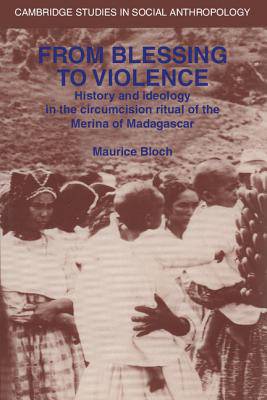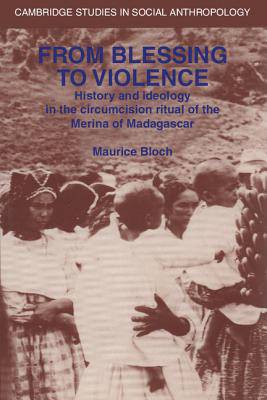
- Retrait gratuit dans votre magasin Club
- 7.000.000 titres dans notre catalogue
- Payer en toute sécurité
- Toujours un magasin près de chez vous
- Retrait gratuit dans votre magasin Club
- 7.000.0000 titres dans notre catalogue
- Payer en toute sécurité
- Toujours un magasin près de chez vous
From Blessing to Violence
History and Ideology in the Circumcision Ritual of the Merina of Madagascar
Maurice Bloch
85,45 €
+ 170 points
Description
The circumcision ritual of the Merina of Madagascar is seen by them primarily as a blessing, involving the transfer of the love and concern of the ancestors of their descendants. Yet the ritual ends in an act of ciolent wounding of the child. Similarily, while the ritual involves a symbolic assault on women, it is nonetheless welcomed by them as a mark of receiving the blessing of the ancestors. In this book, Maurice Bloch provides a detailed description and analysis of the Merina circumcision ritual today, offers an account of its history, and discusses the significance of his analysis for anthropological theories of ritual in general. Pursuing the theme of the combination of religious joy and illumination with violence, Professor Bloch explains how, at various times, the circumcision ceremony can be a familial ritual as well as glorification of a militarist and expansionist state, or associated with anti-colonial nationalism. Describing changes that have occurred in the form of the ritual over two centuries, Professor Bloch argues that in order to understand the properties of ritual in general, it is necessary to view it over a longer time scale than anthropologists have tended to do previously. Adopting such an historical perspective enables him to identify the stability of the Merina ritual's symbolic content, despite changes in its organisation, and dramatically changing politico-economic contexts. As well as presenting an original historical approach to the anthropological study of ritua;, Professor Bloch discusses a range of general theoretical issues, including the nature of ideology, and the relationship between images created in ritual and other types of knowledge. The book will appeal widely to scholars and students of anthropology, history, African studies, and comparative religion.
Spécifications
Parties prenantes
- Auteur(s) :
- Editeur:
Contenu
- Nombre de pages :
- 228
- Langue:
- Anglais
- Collection :
- Tome:
- n° 61
Caractéristiques
- EAN:
- 9780521314046
- Date de parution :
- 30-04-86
- Format:
- Livre broché
- Format numérique:
- Trade paperback (VS)
- Dimensions :
- 147 mm x 234 mm
- Poids :
- 349 g

Les avis
Nous publions uniquement les avis qui respectent les conditions requises. Consultez nos conditions pour les avis.






